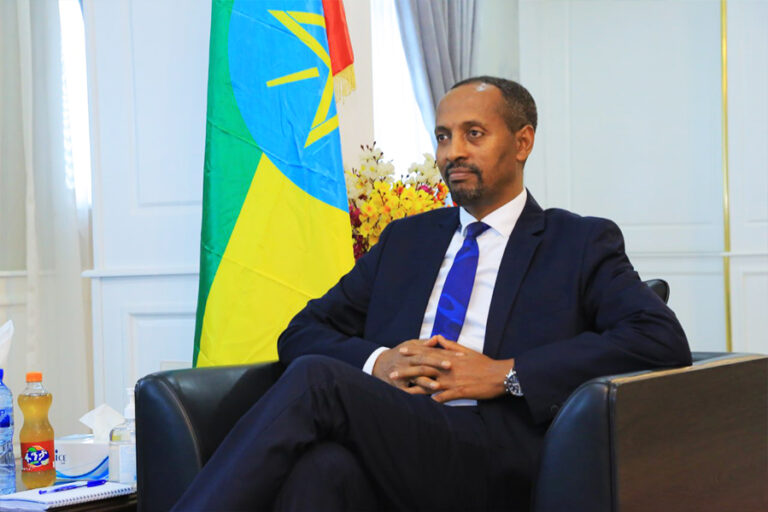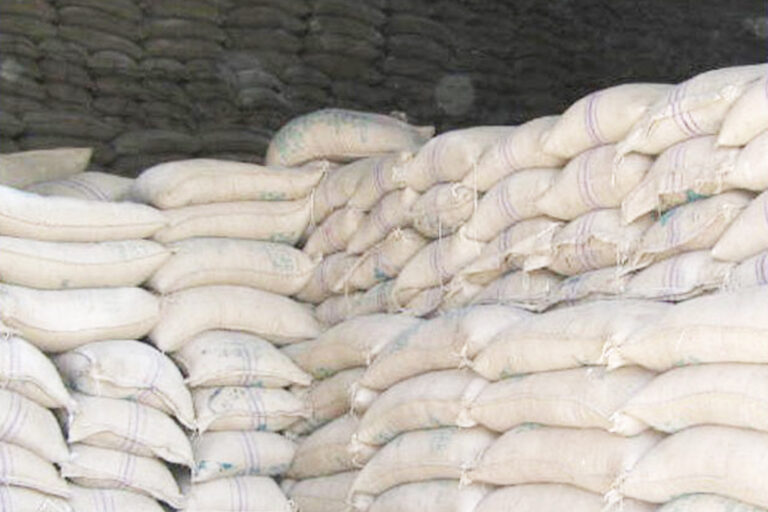The export earnings of the Ethiopian industry sector spikes by a third in the first 10 months of the budget year in comparison to similar periods of last year.
In his report to parliament on Thursday June 16, Melaku Alebel, Minister of Industry (MoI), said that the country secured USD 418 million in the first eight months of the 2021/22 budget year that has an increment of 32.5 percent when compared with the same period of last year.
In the 2020/21 budget year, within the first ten months the country was able to secure USD 315 million from industrial commodity export.
Despite the sector performance bagging USD 102 million more this period, it was 16 percent short when compared to its projection.
MoI had set a target to attain almost half a billion dollar from the industry sector. Even though the country is under pressure by some global market alternatives like AGOA, the textile and leather industries have been able to contribute to the sector’s hard currency earnings. The textile and garment industry contributed USD 153 million and stood atop in the foreign currency earnings followed by the meat and dairy sector which attracted USD 98 million.
The foods and beverage sector also contributed about USD 94 million in the stated period.
Regarding import substitution, MoI had targeted USD 2.2 billion worth of commodities to be covered by local production. However, it attained 85 percent by substituting USD 1.89 billion.
Melaku said that in the stated period MoI targeted to cut the import of USD 105.4 million leather and leather goods and enabled to replace USD 145 million worth or 137 percent of the projection by local production.
Despite the country having an ample position in the leather industry, it losses hundreds of millions of dollar every year so as to import finished leather goods. It has also allocated significant amount of foreign currency for the import of input and accessories for the sector.
In the manufacturing technology and engineering sub sector, the Ministry has targeted to substitute at least USD 242 million and to this end was able to achieve 77 percent.
Similarly, USD 472 million worth of chemical and construction sector imports have been substituted by local production.
Likewise, the food and beverage sub sector was able to substitute USD 1.09 billion worth of import from the projected USD 1.4 billion. From this sub sector edible import is one of the major hard currency consumers.
Export earnings boom in final quarters
Restricted sugar bid sees three bidders advance
Prominent suppliers pull out in the latest restricted international competitive bidding for 200, 000 metric tons sugar procurement process which was opened early this week. The number of participants has also reduced compared with the preceding experience.
It can be recalled that the Sugar Industry Group, the former corporation, refloated the international bid on Thursday June 2, to procure 200,000 metric tons of plantation white cane sugar that will be transported from July to September in eight phases.
The restricted international competitive bid was conducted as per direct invitation of companies, who had shown their interest to supply the basic commodity in the past. On the latest bid opened on Monday June 13, four companies including one, which is not new to the Ethiopian market, submitted its technical and financial proposal, whilst one bidder was disqualified right away because of improper bid security.
As per the new introduced initiative, the Group has taken a swifter evaluation for the technical document and was able to open the financial proposal of the three companies on Wednesday June 15.
Following the opening, Osirius Group, which is stated as a US company, disclosed to supply Brazilian sugar, and offered its rate to transport the sweet with three payment alternatives, on letter of credit (LC) at sight, deferred payment 12 months or 24 months after the shipment.
Osirius which recently participated in the annulled similar bid offered an FOB price USD 545 per ton on payment term of LC at sight, USD 627 differed payment of LC 12 months, and USD 763 LC for 24 months.
Its CFR offer was USD 575 per ton for payment at sight, USD 657 and USD 793 for 12 and 24 months LC payment terms respectively.
Mill House International of South Africa meanwhile has offered FOB USD 450, USD 522 and 561 on the payment condition of LC at sight, differed payment of 12 months and 24 months respectively.
Mill House’s, which also participated on the recent bid but rejected at the technical stage, had its CFR offer at USD 480, USD 552, USD 591 per ton on the payment condition of LC at sight, differed payment of 12 months and 24 months respectively.
Both companies, which are new for the same bid in Ethiopia, have offered USD 30 per ton for freight for shipment of own vessel. However, experts on the sector questioned the fright rate.
“It is well known that the freight price has skyrocketed at the global market. There freight request that the commodity will be loaded from Brazil if they shall secure the award is unrealistic in the verge of logistics price hikes,” an expert who followed the case told Capital.
The third qualified company, ED & F Man of the UK has offered USD 715, USD 715, and USD 815 for FOB on the payment condition of LC at sight, differed payment of 12 months and 24 months respectively. Its CFR offer was USD 825, USD 825 and USD 825 for the three payment modalities respectively.
The company which is new to the Ethiopian market has demanded USD 110 per to for freight of owned vessel.
So far Capital has not been informed on the final award, while the price validity will be till the end of the coming week.
The participation of reliable companies has reduced from time to time which experts state as a reason for the frequent bid cancelations which erodes the confidence of big companies.
The country procures about half of its demand, while it has a capacity to produce 365,000 metric tons of sugar per annum.
Odorless poultry house innovation scoops prize award
Heifer Project International organized the final event of the 2022 AYuTe Ethiopia Challenge where the top-5 finalists competed on a pitch competition held at Elilly International Hotel on 13 June 2022.
In the final-round pitch competition, Meskerem Yemaneh Kahsay, BSc holder in Automotive Engineering from Bahirdar University with an odorless poultry house innovation idea become the 2022 AYuTe Ethiopia Challenge Champion and received the 10,000 USD cash prize.
AYuTe Ethiopia Challenge is a national edition of AYuTe Africa Challenge open to youth AgriTech innovators in Ethiopia. The objective of AYuTE Ethiopia Challenge is to identify winning agricultural and innovative tech ideas with the potential to address challenges of smallholder farmers in Ethiopia by improving production, productivity, income, access to finance and/or resilience and to award a young AgriTech innovator who stand-out in stages of innovation pitch competition.
AYuTe Ethiopia competition is a national Competition open to applications from all regions and federal administrations of Ethiopia. AYuTe Ethiopia Challenges comes with a total prize of 20,000 USD cash award for the top-three winners as first gets 10,000 dollars, whilst the second receives 6,500 dollars and the 3rd 3,500 dollars.
The Ethiopian Civil Society Organizations Council (ECSOC) and the Ethiopian Political Parties Joint Council (EPPJC) signed a memorandum of understanding
The Ethiopian Civil Society Organizations Council (ECSOC) and the Ethiopian Political Parties Joint Council (EPPJC) signed a memorandum of understanding (MoU) in a move to work together by setting aside barriers that separate them and focusing on the common grounds pertaining to national issues.
The two sides underscored that one of the issues that needs to be given due emphasis is National Dialogue Process and civil societies, as well as political parties, need to come together to address issues of peace building in the nation.
Speaking on behalf of the Ethiopian Civil Society Organizations Council, Henok Melesse, Executive Director of ECSOC, said that “even though civil societies and political parties have several issues that set them apart, it is important to closely work together for the common good of the nation as both sides also have various mutual areas.”
Chairperson of the Ethiopian Political Parties Joint Council Rahel Baffie, said “we must learn to live together as a nation. As civil society and political parties are key stakeholders in the national dialogue process, the decision to work together in this historic collaboration will be of great national benefit.”




